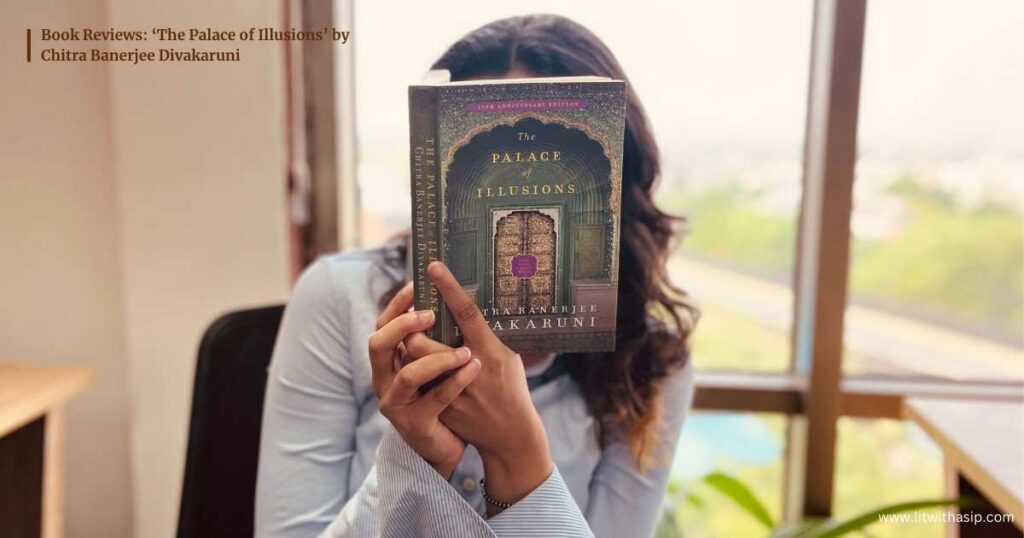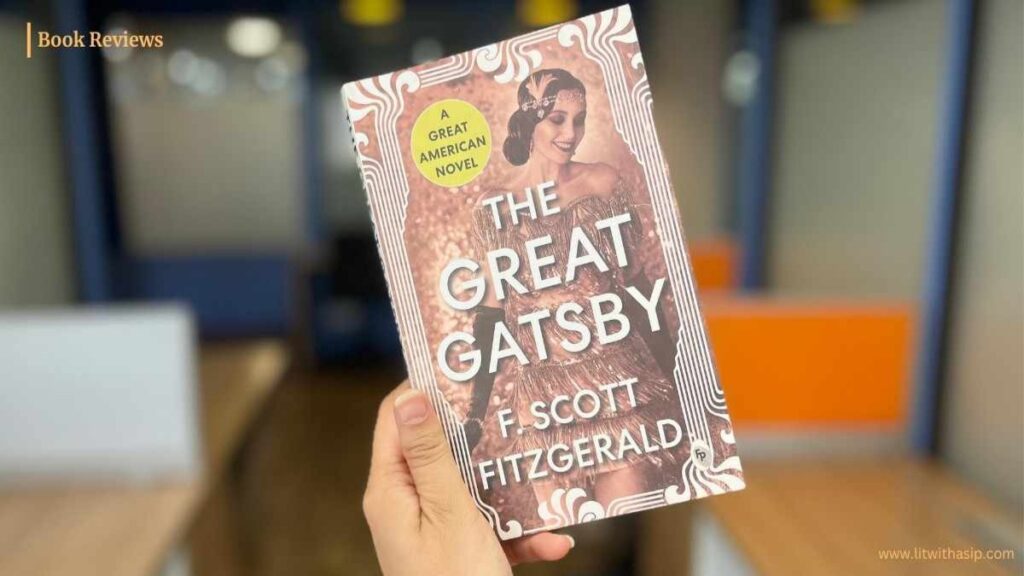
A 2008 novel by Chitra Banerjee Divakaruni, ‘The Palace Of Illusions’ is regarded as a retelling of the Hindu epic Mahabharata as delineated from Draupadi’s perspective. Draupadi, referred to as Panchali throughout this book because she was the princess of Panchala, has stood as an eminent womanist figure in numerous Indian literary works. Works like “Yajnaseni” by Pratibha Ray also focus on Draupadi’s perspective. However, ‘The Palace Of Illusions’ stands out for a few reasons.
The novel gives us an insight into Draupadi’s heart and mind with a psychological depth worth praising. It explores Draupadi’s life, emotions, and experiences, offering a feminist reinterpretation of a male-dominated myth, unlike other retellings. Her character is given voice by Banerjee which is often overshadowed by the male heroes of the Mahabharata like the Pandavas and Kauravas.
Banerjee’s narrative style is modern and accessible, making the ancient epic more relatable to contemporary readers while still retaining its mythological essence. She humanizes the mythological figures, portraying them as flawed individuals engaging in human experience. The novel explores themes such as power dynamics, loyalty, betrayal, and the nature of destiny.
The novel begins with Panchali’s swayamvara (self-choice ceremony) where we come across her inner monologue. Her birth mother is not prominently featured or mentioned in the narrative of the book. Instead, it emphasizes her upbringing, experiences, and relationships within the context of the Kuru royal family. She is nervous and questioning about what is to come as she approaches her swayamvara.
Panchali initially harbors feelings for Karna but ultimately chooses Arjuna as her husband because of Karna’s lower social status and honor. This sets the stage for tension and complex relationships and dynamics among the characters. Panchali’s initial feelings for Karna, while genuine, may have been overridden by familial and social expectations.
Due to Kunti’s misunderstanding, Panchali’s marriage to Arjuna becomes a significant event in the story, highlighting the unique situation where she becomes the wife of all five brothers. The polyandrous marriage symbolizes complex themes such as unity, harmony, and interconnectedness. Panchali’s agency and autonomy within her marriage to the Pandavas raise questions about individual identity, giving it a womanist dimension. It also invites philosophical reflections on dharma (righteousness), duty, and ethical dilemmas.
Continuing forth, we are introduced to Mayasabha or ‘The Palace Of Illusions’, a magical palace built by the Hindu mythological figure ‘Mayasura’. This is the place after which the book is named. It is somewhere that Draupadi finds a way to navigate the illusions of her world and confront the complexities of her destiny with resilience and courage. One day, Panchali laughs uncontrollably at Duryodhana’s comical mishap at the palace of illusions while attempting to sit on a pool of water, giving rise to his hidden resentment and humiliation.
Then, the most infamous game of dice between the Pandavas and Kauravas in the Mayasabha escalates existing resentments and leads to Draupadi’s harrowing humiliation after the Kauravas win through deceit and manipulation by Shakuni. The reckless gambling leads to the Pandavas’ loss of their kingdom and freedom, ultimately resulting in Panchali’s public humiliation which has been vividly described in Mahabharata as well as its other retellings.
While the disrobing incident (where Panchali is publicly humiliated and almost stripped in the assembly hall) is a significant and distressing event, the narrative does not dwell extensively on the graphic details of the incident. Divakaruni’s approach focuses more on Draupadi’s emotional and psychological response to the trauma rather than depicting the explicit physical violence.
The defeated Pandavas later went into the exile period where Panchali accompanied them, enduring hardships and challenges alongside them, which strengthened their bond and underscored her unwavering support for her husbands. The exile in the Mahabharata refers to the period of 13 years of exile in the forest followed by 1 year of incognito life that the Pandavas were obligated to endure. During this time, Draupadi faces deep disrespect when none of the Pandavas offer to help her up after she falls, highlighting the strain and complexities within their relationships.
As the novel slowly progresses towards its end, Panchali is seen ascending to heaven, her earthly trials and tribulations transcended. Her spirit ultimately reunites with Karna, the one she fell for initially. It must be noted that in the original Mahabharata epic, there is no explicit mention of Draupadi’s spirit reuniting with Karna in heaven. Draupadi and Karna share a complex relationship in the epic, marked by unspoken feelings and missed opportunities due to the unfolding events of the Mahabharata narrative.
In concluding notes, ‘The Palace of Illusions’ offers a poignant and immersive retelling of the Mahabharata through a womanist perspective. Chitra Banerjee Divakaruni’s rich storytelling breathes new life into the epic saga, delving deep into Draupadi’s psyche and experiences while highlighting themes of complicated human relationships and women’s position in society. This novel is a testament to the power of myth and the enduring relevance of ancient stories, reimagined through a lens that celebrates the strength and spirit of its female protagonist.
Frequently Asked Questions
Also Read This:- The Alchemist by Paulo Coelho

Jennis Jacob, a passionate literary enthusiast in her 20s, is a writer and poet. With eight years of experience in literature, she is currently a master in English and finds inspiration in Womanist, American, and Indian Partition Literatures. Her works have appeared in anthologies such as ‘Carved Words Of Creative Minds’ and ‘100 Splendid Voices,’ and she is working on upcoming books. Through LitWithASip, she aims to ignite a love for literature and empower individuals to embrace their true selves.


This web site is really a walk-through for all of the info you wanted about this and didn’t know who to ask. Glimpse here, and you’ll definitely discover it.
I do not even know how I ended up here, but I thought this post was good. I do not know who you are but definitely you are going to a famous blogger if you are not already 😉 Cheers!
We’re a group of volunteers and opening a new scheme in our community. Your web site offered us with valuable information to work on. You’ve done a formidable job and our whole community will be thankful to you.
Hello there, I found your site via Google while searching for a related topic, your website came up, it looks great. I’ve bookmarked it in my google bookmarks.